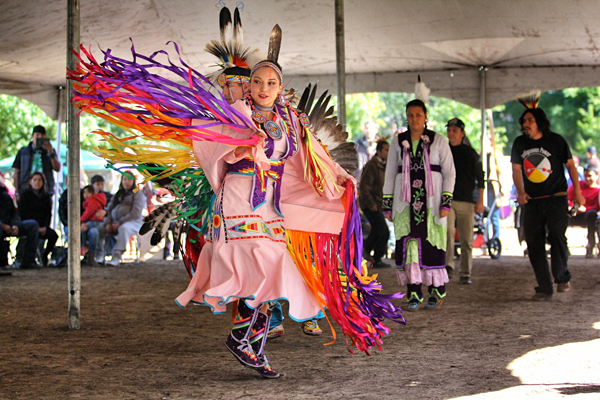
By Neale McDevitt
McGill’s fourth annual Indigenous Awareness Week came to a lively, colourful close on Friday, Sept. 19, with dancers dressed in traditional costumes performing an inter-tribal dance during the Pow Wow on the lower campus field in front of dozens of smiling spectators. Even as the sounds of the drums faded and the dust settled on the dance floor, the weeklong event was being touted as a rousing success.
In all, more than 550 people took part in some 15 events over the course of Awareness Week (from Sept. 15-19). Organized by the Social Equity and Diversity Education Office (SEDE), the week honoured the many Indigenous cultures across the country including First Nations, Métis and Inuit. The diverse program of events included everything from the Kairos blanket exercise; dreamcatcher-making workshops; screenings of short films by Indigenous filmmakers; and a series of lectures by noteworthy speakers.
“As a Mi’kmaq, I am honoured to provide awareness and education about the realities, identity and history of Indigenous people in Canada on campus. Indigenous Awareness Week opens up the dialogue about Indigenous peoples in Canada and is helping shift the culture at McGill to be inclusive and a safe space for everyone,” said Allan Vicaire, Indigenous Education Advisor, SEDE. “The best part of the week for me was the students. Throughout the week, they wanted to talk to me about what they learned and tell me how much the various events meant to them. The best part of my job is sharing my people’s experiences with others.”
That sort of storytelling and history-sharing was a large component of Awareness Week, with the tone being set right from the start. “I really enjoyed Kahente Horn-Miller’s talk during the Opening Ceremony because it interweaved traditional teachings of the Two-Row Wampum, Seven Generations and the Small Condolence Ceremony and how we can translate this knowledge and use them as tools to build responsible and accountable relationships,” said Paige Isaac, Coordinator, First People’s House. “And I always enjoy facilitating the Kairos Blanket Exercise and witnessing students grasp the realities and experiences of Indigenous peoples through this interactive walk through history. This is the history lesson that is missing in most students’ K-12 experience.”
New to Awareness Week was the first-ever Indigenous Homecoming. Held at the Faculty Club, the event drew more than 20 Indigenous alumni from the faculties of Law, Education, Social Work, Arts, Science and Medicine. In the keynote address, McGill alumna, Audra Simpson, a professor of Anthropology at Columbia University, dicussed the significance of McGill as a training ground for scholarship and engaged political life. “[Simpson’s] insight on how McGill can become a better space for Indigenous people to thrive was exciting. Her talk can be applied to any institution on how we can come together and provide the best for Indigenous students in Canada,” said Vicaire. “The alumni were very pleased of the event. It really provided an opportunity for many to reconnect and forge new friendships.”
